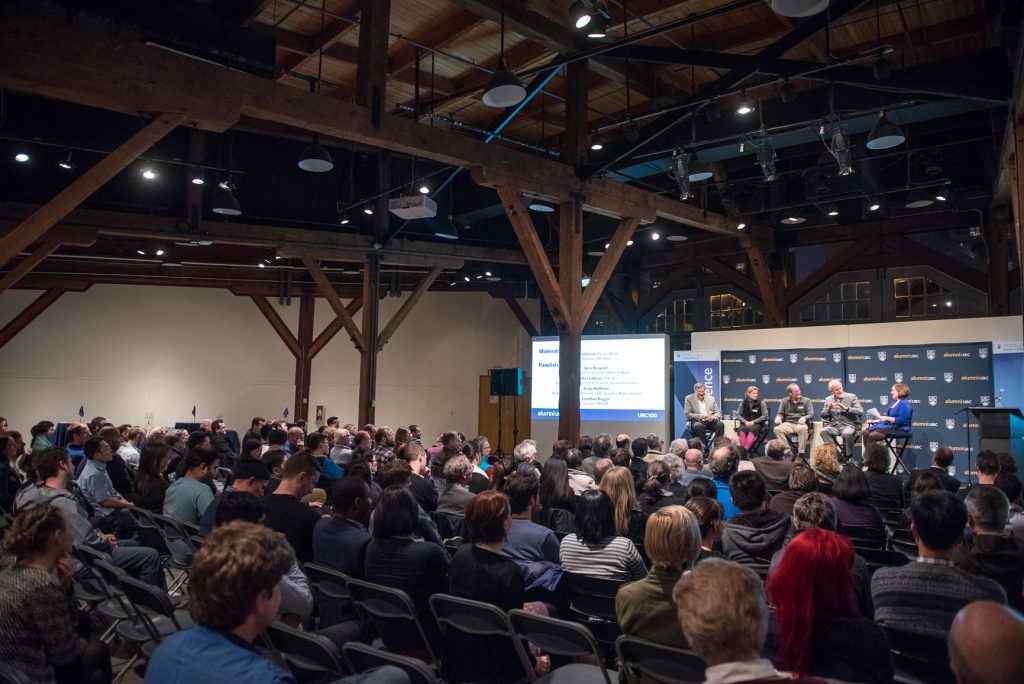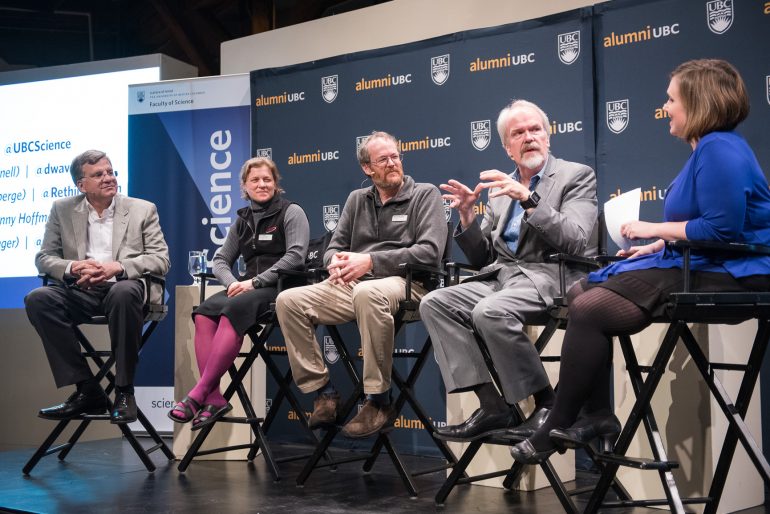Just the other day, the CEO of one of Vancouver’s most recognized tech startup-turned-unicorns was blasting the city’s unaffordability for putting the brakes on its burgeoning tech sector. Almost at the same time, a panel of academics technologists and entrepreneurs at the Innovation City event was playing up the positive: that the city is poised to make a quantum leap. Indeed, several of the panelists found themselves agreeing about the hurdles that stand in the way – but still held out a strong hope that their tech sector was on the verge of greatness.
In contrast with the vast majority of tech events in this city that tend to cater to the digital marketing and app development crowd, participants and attendees seemed more at home with bleeding-edge scientific research involving quantum mechanics and super-heated plasma – stuff that leaves even your average web coder (or reasonably well-informed tech journalist) scratching their head. The panel included CBC News Reporter Lisa Johnson (as moderator), D-Wave President and CEO Vern Brownell, General Fusion Inc. Founder Michel Laberge, UBC Quantum Matter Institute Physics and Astronomy Professor Jenny Hoffman, and Jonathan Bagger, Director of TRIUMF, Canada’s national laboratory for particle and nuclear physics and accelerator-based science.
Vancouver’s tech hub exists in two states simultaneously: already arrived and not quite there yet
“Initially, I was skeptical,” said Brownell, thinking back to his first introduction to D-Wave, the world’s first quantum computing company that now delivers its machines to the likes of Google and Lockheed-Martin. The company does its work far from the world-renowned labs of Boston and Silicon Valley, in Burnaby, BC. “But I fell in love with the company because the earnestness of the people actually doing the science here was off the charts. To some extent, it’s remarkable what we’ve already done here, creating two companies funded by venture capital, invested in cutting-edge science. Something is happening already and we need to leverage that.”
Nothing cultivates success like success, Brownell added – saying that getting to that quantum leap would ultimately require a proven winning record, which is even harder to show off within frames of long-term scientific research. But measurable successes are happening.
“At the end of last year, Google (which is a customer of ours) had a theoretical problem that would have taken them one hundred million computers to solve,” Brownell said. “Our machine got the answer in seconds. You could take all the computers in the world and not solve that problem as quickly. That’s indicative of what we can tap into on a fundamental level to build something that’s going to outperform classical computing for solving humankind-scale problems. There’s rightly a lot of skepticism about what we’ve been doing. But even our harshest detractors are interested in the result we were able to achieve.”
“Vancouver has already taken a quantum leap ahead of the old economy of cutting trees and digging gold,” Laberge said. “This is new and really happening here… On the quantum mechanics side of it, will it be a hub? I don’t know. But as for high-tech, we’re already there. Part of the reason is the people here, there’s good training at UBC and people come here to work in science. It’s new that kids are coming out of university wanting to start a company, instead of wanting to get a job with IBM or GE.”

What might turn Vancouver’s tech sector fusion reaction into a big fizzle?
In D-Wave’s quantum computers, the key technology operates at a temperature 400 times colder than interstellar space; next door at Fusion, the technology operates at 100 million degrees Celsius. It’s all very impressive – but which temperature really best represents the state of the local tech hub?
Part of the problem in bringing attention and investment to the city’s tech sector is the hurdle in explaining how this new science applies to the mainstream consumer. Bagger pointed to advances in cancer treatment and drug therapies stemming from physics research, while Hoffman pointed to the potential for developing new superconductors and batteries more efficient than anything we’ve seen. That said, “It’s harder to convince government and investors to fund this,” Laberge acknowledged. “It’s harder to sell this than a mobile app you can just buy on your phone.”
“Something is happening already and we need to leverage that.”
Meanwhile, on the PR side, Johnson admitted that people in her newsroom felt “scared” about covering D-Wave’s technology; if a reporter couldn’t understand the technology fully, how could they ask meaningful questions from a skeptical audience, much less report honestly to the public?
“We all have the same biases,” Brownell replied. “There’s a big gap in the world of investors looking for the next Whatsapp, which is something they can understand and have success with. What fuels Silicon Valley is home runs, which attracts good people who in turn start other companies and so on. When it comes to science-based investments, we’re renegades and only a handful of investors in Silicon Valley will invest in real long-term science.”
How to help the tech hub reach a positive state?
A lot of it is about attracting talent. “We have a responsibility as people who live and breathe this to communicate the excitement of what we get to do,” Hoffman said. “We appreciate we’re part of a huge team doing this. This kind of quantum leap is not going to happen by accident, but because people want to be excellent. Silicon Valley didn’t happen by accident.”
Of course, even if you can attract people here, you have to get them to stay. “In terms of housing, it’s actually more expensive here than in other tech centers, but the pay scale is lower – so someone really has to want to live here,” Bagger said.
“Housing prices, tax policy, immigration – these policies are my biggest complaints,” Brownell said. If local companies can’t afford to pay Silicon Valley rates for top talent, then they need to be able to offer other perks– and government talking about taxing stop options more as a way of getting the rich to pay their share isn’t helping, Brownell noted.
Vancouver also needs to grow its tech pie so companies don’t end up cannibalizing from each other. “We’re starting to poach talent from each other,” Laberge said. “If we have more people, we’ll be less likely to see that.”
Connecting innovators for learning, collaboration and partnership is essential as well. The city’s founders and investors need to produce more connections between companies, industries and areas of science, Bagger said. “The more interconnections, the better. The physics community needs to learn who’s out there. Let’s start the Vancouver-area physics calendar, like what they have in Boston.”
Feature Photo Credit. V. Saran Photo


